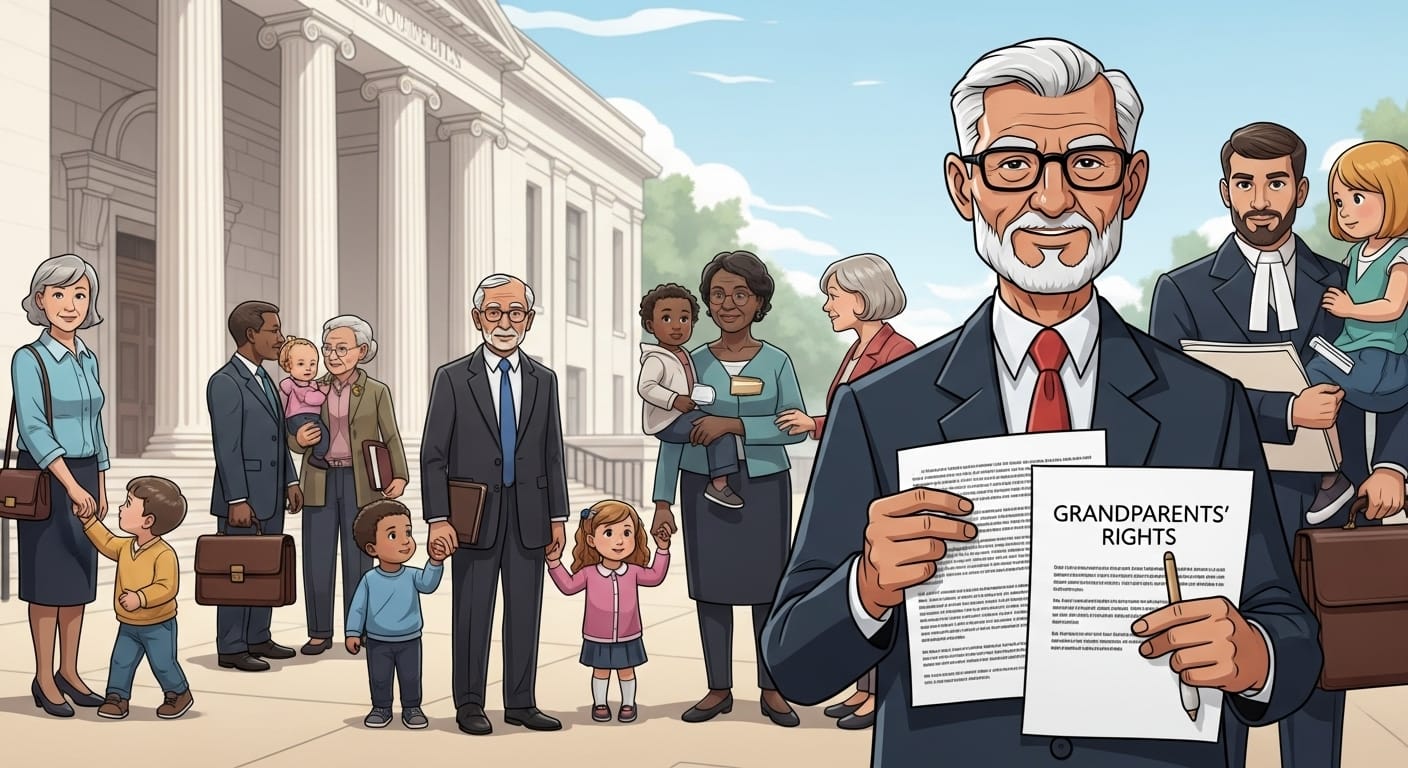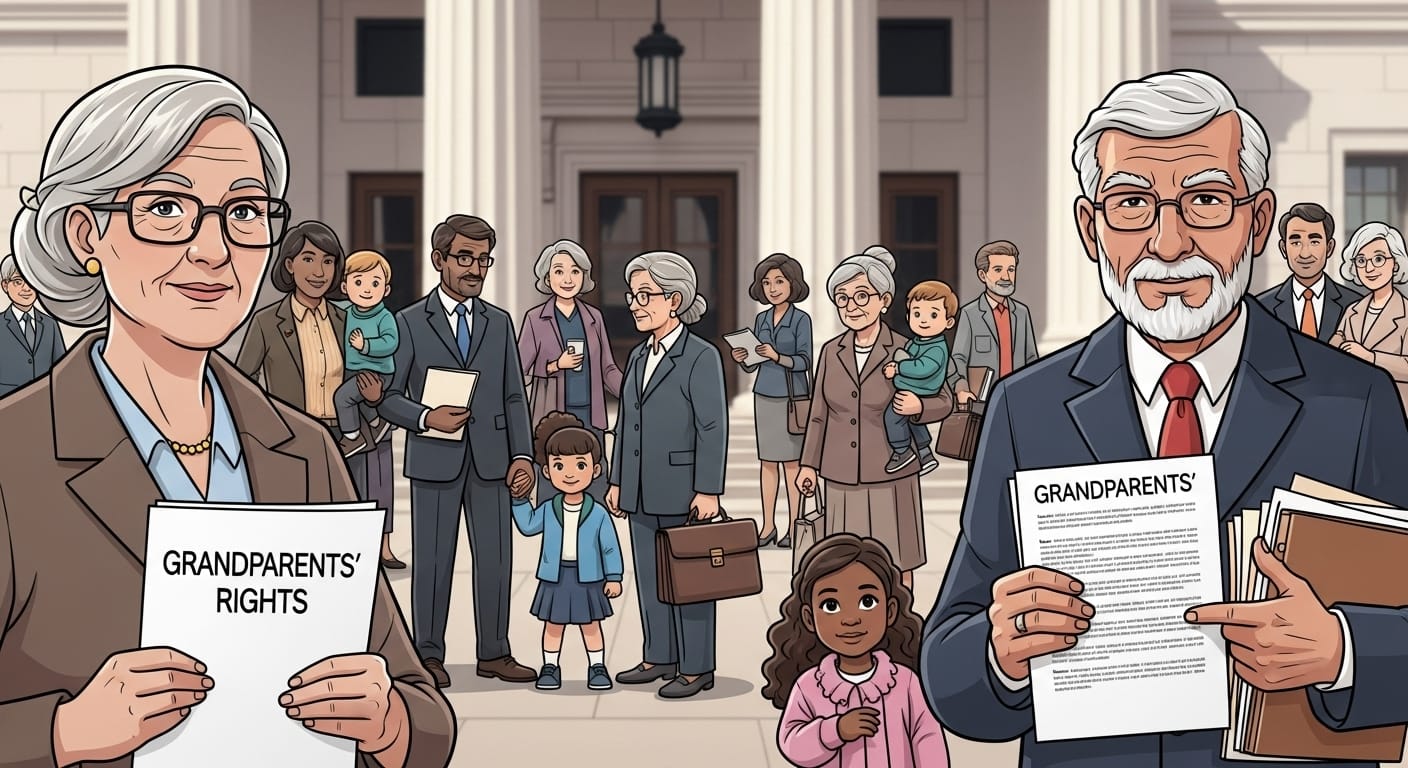Grandparents. They’re the magical folks who always seem to have candy in their pockets and stories that start with, “Back in my day…” But what happens when the family dynamics take a detour and their relationships with their grandkids hit a legal snag? It turns out, family law has a lot to say about grandparents’ rights, and it’s not all as straightforward as a game of Go Fish.
If you’re a grandparent wondering how to stay involved in your grandchildren’s lives—or maybe just looking to understand your legal standing—you’ve come to the right place. Let’s break down the rights of grandparents in family law, with just enough legal know-how to keep you from banging your head on the nearest family court bench.

Top Takeaways and Key Concepts
Grandparents’ legal standing depends on family circumstances and varies by state laws.
Visitation rights are determined by the child’s best interests and the existing relationship.
Custody may be granted if parents are unfit, requiring strong evidence and documentation.
Adoption can affect grandparents’ rights, especially if the child is adopted outside the family.
Mediation and legal counsel can help resolve disputes efficiently and protect grandparents’ rights.
Summary of This Article
The article explains grandparents’ rights in family law, including legal standing, visitation, and custody. Courts focus on the child’s best interests, balancing parental rights with the grandparent-child relationship. Custody is considered if parents are unfit, and adoption—especially outside the family—can terminate grandparents’ rights. State laws vary, making legal guidance essential. Mediation offers a less confrontational alternative, while an experienced attorney helps navigate complex rules and present a strong case.
Legal Standing of Grandparents

To kick things off, let’s talk about the concept of “legal standing.” This is a fancy term that essentially asks, “Do you even have the right to be here?” When grandparents seek visitation or custody rights, courts first determine if they have standing to make a claim.
Interestingly enough, this often depends on the specific circumstances of the family. For instance, if both parents are alive, together, and capable of caring for the kids, grandparents’ rights can be pretty limited. But if the family is dealing with divorce, parental unfitness, or the unfortunate loss of a parent, the legal doors might open just a crack.
And by the way, standing can vary wildly depending on where you live. Some states are more grandparent-friendly than others.
Visitation Rights

Visitation rights are a big deal in family law, and grandparents often find themselves tangled up in these cases. After all, what’s more heartbreaking than being kept from the grandkids you used to babysit every Tuesday while eating mac and cheese straight from the pot?
Courts look at several factors when deciding visitation rights. Chief among them is the “best interests of the child.” This includes things like the existing relationship between the grandparents and the child, the stability of the home environment, and whether the grandparents are likely to spoil them with too much sugar (just kidding—sort of).
On the other hand, courts also have to weigh the parents’ rights to decide who gets to hang out with their kids. It’s a delicate balancing act, and honestly, it can feel a bit like a game of legal Twister.
Custody Battles
When things escalate beyond visitation, custody can come into play. And let’s be honest, this is where it gets messy.
Grandparents usually pursue custody when the parents are deemed unfit due to issues like neglect, abuse, or substance abuse. It’s not an easy road, but courts have been known to grant custody to grandparents in cases where it’s clear they provide the safest and most stable environment for the kids.
That said, winning custody isn’t a cakewalk. It requires solid evidence, often in the form of witness testimonies, documentation, and possibly even a few appearances by child welfare experts.
The Role of State Laws
Speaking of which, let’s not forget how much state laws affect grandparents’ rights. Family law is handled at the state level, meaning you could have very different outcomes in, say, Florida compared to Wisconsin.
Some states have specific statutes outlining when grandparents can seek visitation or custody. Others leave it more to judicial discretion, which is a nice way of saying, “It depends on how the judge feels that day.”
This is why it’s crucial to understand the rules where you live—or better yet, consult a lawyer who can explain them in terms you don’t need a law degree to understand.
Mediation as an Option
If you’re not a fan of courtroom drama (and who is, really?), mediation might be the way to go. Mediation involves working with a neutral third party to find a solution that everyone can live with.
To be fair, mediation doesn’t always work, especially if the conflict is particularly nasty. But when it does, it can save a lot of time, money, and emotional stress—not to mention keep the family dynamics from completely falling apart.
When Adoption Comes into Play
Interestingly enough, adoption can have a huge impact on grandparents’ rights. In many states, if a child is adopted by someone outside the family, grandparents’ rights are effectively terminated.
On the other hand, if the adoption occurs within the family—say, by a stepparent—grandparents might still have a shot at maintaining their relationship with the child. Again, it all comes down to the specific laws in your state.
The Best Interests of the Child
At the heart of every decision involving grandparents’ rights is one key question: What’s best for the child?
Courts consider everything from the emotional bond between the child and the grandparents to the stability of the home environment. And while this might seem like common sense, it’s amazing how complicated “best interests” can get once lawyers start arguing about it.
Why Legal Help is Essential
Finally, if you’re a grandparent navigating family law, do yourself a favor and get a good lawyer. Seriously, you wouldn’t try to assemble IKEA furniture without the instructions, so why go into court without legal guidance?
An experienced family law attorney can help you understand your rights, gather evidence, and present your case in a way that gives you the best chance of success. Plus, they can explain all the legal jargon so you don’t have to Google “amicus curiae” at midnight.
Resources
Grandparents’ Rights in Family Law
https://www.americanbar.org/groups/family_law/grandparents-rights/
State-Specific Guide to Grandparents’ Rights
https://www.findlaw.com/family/your-rights-as-a-grandparent.html
Custody and Visitation Rights for Grandparents
https://www.legalaid.org/grandparents-custody-visitation
Frequently Asked Questions
Do grandparents have legal rights to visit their grandchildren?
In many states, grandparents can request visitation if it serves the child’s best interests. However, parental rights often take priority unless exceptional circumstances exist.
Can grandparents gain custody of their grandchildren?
Yes, but custody is usually granted only if the parents are deemed unfit due to neglect, abuse, or incapacity. Courts require clear evidence that custody serves the child’s welfare.
How do state laws affect grandparents’ rights?
Family law varies by state. Some states have detailed statutes protecting grandparents’ rights, while others rely on judicial discretion to decide each case individually.
What happens to grandparents’ rights if a child is adopted?
If a child is adopted outside the family, grandparents’ rights are often terminated. In cases of stepparent or relative adoption, some rights may still be preserved.
What factors determine visitation or custody outcomes?
Courts prioritize the child’s best interests, considering emotional bonds, family stability, and whether continued contact benefits the child’s overall well-being.
Is mediation a good option for resolving family disputes?
Yes. Mediation offers a less confrontational and cost-effective way to resolve disputes, allowing families to reach mutual agreements without lengthy court battles.
Why should grandparents consult a family law attorney?
An attorney helps interpret state laws, prepare evidence, and represent grandparents effectively in court. Legal guidance ensures rights are properly understood and protected.

Kevin Collier is a legal expert passionate about simplifying complex legal concepts for everyday individuals. With a focus on providing clear, practical information, he covers a wide range of topics, including rights, responsibilities, and legal procedures. Kevin aims to empower readers with the knowledge they need to navigate the legal landscape confidently, ensuring they can make informed decisions regarding their legal matters. Through insightful articles and easy-to-understand resources, he helps demystify the law, making it accessible to all.










